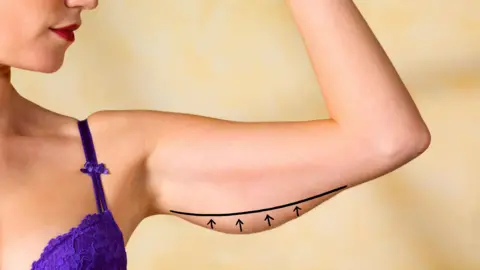The procedures driving UK's cosmetic surgery rise
 Getty Images
Getty ImagesTreatments to remove wrinkles and tone arms, thighs and stomachs are driving a rise in cosmetic surgery, the latest figures from UK private clinics suggest.
There were 27,462 procedures performed in 2024 - a 5% rise on 2023 - of which more than nine in ten were on women.
Boob jobs remained the most popular treatment, followed by breast reduction surgery in second place.
But much of the rise was driven by increases in facial rejuvenation surgery, such as face and brow lifts and body contouring procedures like liposuction and tummy tucks, according to the British Association of Aesthetic Plastic Surgeons (BAAPS).
The association's president said surgery has become cheaper and easier to access, while some patients say there is less stigma around cosmetic procedures.
The most popular cosmetic surgeries, with their change from 2023 to 2024, are:
- Boob job (up 6%)
- Breast reduction (up 1%)
- Blepharoplasty, or eyelid surgery (up 13%)
- Abdominoplasty, or tummy tucks (up 6%)
- Liposuction, or fat removal (up 8%)
- Rhinoplasty, or nose jobs (down 1%)
- Face/neck lift (up 8%)
- Fat transfer (up 5%)
- Breast implant removal (down 5%)
- Otoplasty, or ear correction (up 2%)
There was also a 24% rise in thigh lifts, and a 13% increase in brachioplasty, or "bingo wing" removal.
Non-surgical procedures like botox and fillers were also popular: nearly 10,000 were performed by BAAPS members in 2024.
But "designer vagina" labiaplasty surgery, which changes the shape or size of the labia, appeared less popular, with the number carried out down by 7%.
Nugent said that cosmetic surgery had become "more accessible", and while she acknowledged that treatments still were expensive, she said that they had become a bit more affordable.
This has coincided with a "shift in attitude" towards cosmetic procedures over the past decade because of a movement in society "towards wellness and looking after oneself", she said. Cosmetic surgery is "more normalised", she added.
Some of the growth in cosmetic surgery is also caused by people who previously had non-surgical procedures, like filler and Botox, now choosing to go under the knife because they were getting "fatigue" from repeatedly going to clinics to get the work done, Nugent said.
And the rise of weight-loss injections such as Ozempic, Wegovy and Mounjaro have played a role, too. Nugent said that some people taking these medications, also known as "skinny jabs", are getting surgery on their face.
"As they lose weight they start to notice deflation and some sagging of their face," she said.
The BAAPS statistics do not show how many people have surgery after taking weight-loss drugs, but Nugent said that of the patients she has treated, "more and more" are people taking the medications.
'There's not as much stigma'
People have cosmetic surgery for a wide range of reasons.
Kirsten White, 33, a talent acquisition specialist from Sheffield, had a breast reduction and uplift after losing weight with a gastric sleeve.
She said her "breasts were basically down to my bellybutton" before surgery, leading to backache and the need for physiotherapy, she said.
"I don't think people are surprised when I tell them I've had cosmetic surgery because I think it's pretty normal now," she said.
"There's not so much the stigma that there used to be that it's really taboo and people are a lot more supportive of doing what will make you feel happy."
 Kirsten White
Kirsten WhiteMen underwent 1,799 surgical procedures in 2024, a slight drop from 2023 - making up just 6.6% of all surgeries in the BAAPS dataset.
Nose jobs (rhinoplasty) remained the most popular among men, with 332 surgeries done in 2024, which is a 14% drop on 2023.
Face and neck lifts increased by 26%, with 140 done in 2024, suggesting a growing interest in anti-aging procedures among men - though Nugent said it was harder to spot trends for men due to the smaller numbers treated.
Video calls 'heightened our awareness of our appearance'
Beauty standards are shaped by social media and celebrity culture, said Dr Beth Daniels, director of the Centre for Appearance Research at UWE Bristol.
The pandemic also caused a shift, when the move towards video calls "heightened our awareness of our appearance" because people saw their own faces on their computer screens.
Dr Daniels said that society places value on youthful looks, which could push some women to get cosmetic procedures.
"As women age, they're often discounted in a number of ways" and are "made to feel invisible in society", she said.
BAAPS vice president Anthony Macquillan suggested the overall increase in facelifts could be linked to societal changes, such as the rising pension age.
He said: "For many, this type of surgery is not just aesthetic but also functional, helping to maintain confidence, secure employment, and reduce anxiety associated with age-related bias."
The BAAPS data is based on statistics from 233 of its members. Jim Frame, president of the UK Association of Aesthetic Plastic Surgeons and professor at Anglia Ruskin University, said that it does not cover all of the cosmetic surgery operations that happen in the UK because some is carried out by ENT and maxillofacial surgeons, or by non-BAAPS members, especially fillers and Botox.
The data also does not include surgeries carried out overseas, where the lower cost of treatment in countries like Turkey attracts Brits.
Cosmetic procedures and surgery carry risks and the NHS warns that they "can lead to serious complications if they're not done correctly".
It advises people to research thoroughly beforehand, including checking the credibility of the clinic and getting information about the most common complications of the procedure.
"There are a lot of susceptible people that are committing to surgeries that a fairly large proportion will regret," Prof Frame said.